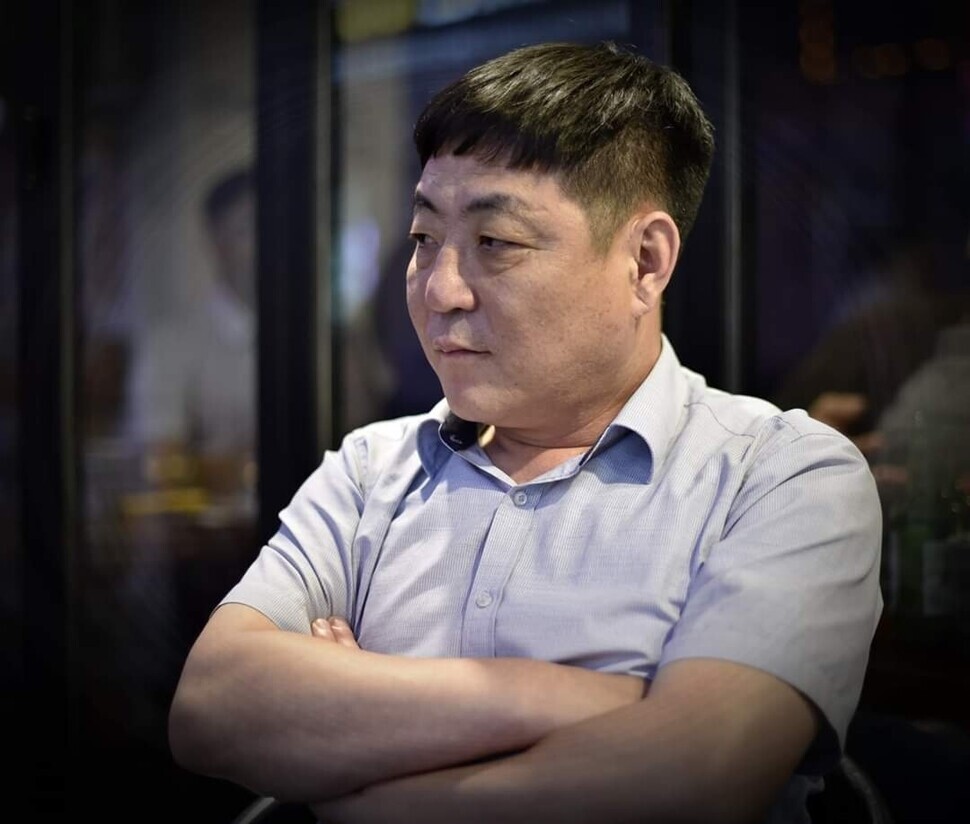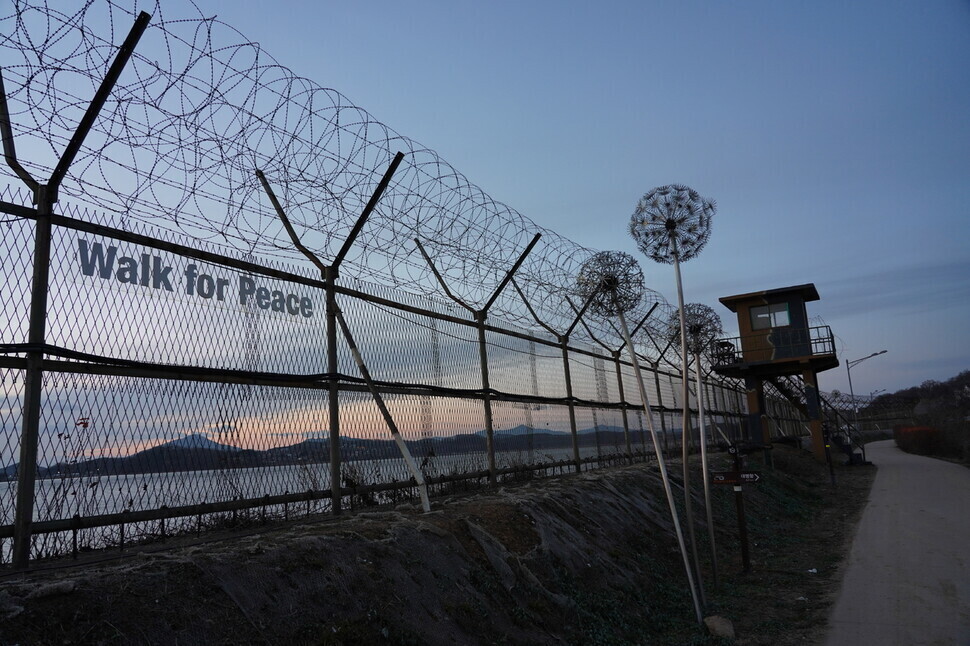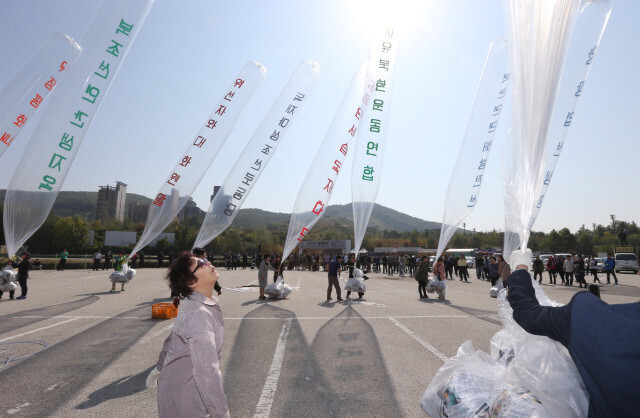hankyoreh
Links to other country sites 다른 나라 사이트 링크
[Interview] Defector groups get paid to launch propaganda balloons, former N. Korean soldier says

After the South Korean government and Gyeonggi Province took tough measures to stop defector groups from launching balloons loaded with propaganda leaflets into North Korea, defector groups have defended their actions as being part of an internationally recognized human rights movement. But a defector who used to be an officer in the North Korean military has come forward to criticize the balloon launches, arguing that peace on the Korean Peninsula should take precedence over the balloon launches, which he said have become a contentious source of cash for defector groups.
Hong Gang-cheol, 47, who commanded a guard post on the DMZ for the North Korean army, gave the Hankyoreh a telephone interview on June 13. “Some defector groups have started to squabble over who will benefit from the balloon launch business. It’s reached the point where they’re starting to accuse each other of being dishonest,” he said.
After graduating from North Korea’s Kang Kon Military Academy, Hong was assigned to command a guard post on the border with South Korea. He was training workers at a construction materials factory in Musan, North Hamgyong Province, when he defected in 2013. He made his way to South Korea by way of China, Laos, and Thailand, but was indicted as a North Korean spy. Hong was acquitted by a district and high court and is currently awaiting a ruling by the South Korean Supreme Court.
Conservative organizations pay defectors to launch balloons“The studies I’ve read and online communities used by defectors themselves indicate that [defector groups] are paid about 1.5 million won (US$1,234) for launching a single balloon [used to carry propaganda leaflets]. But the actual cost for a balloon is between 80,000 and 120,000 won (US$65.81-98.21) These groups are getting credit for launching balloons that bring in 10 times their cost. Then they report their activities to [conservative groups in] the US, who give them funding,” Hong said, detailing the fierce competition among defector groups for balloon launch contracts.
“The group that had been launching the balloons had assigned the work to a certain defector. But after learning the ropes, that defector then left the group and started launching balloons on his own, which is what kicked off the competition. So basically what was a teacher-student relationship turned into a rivalry, and now they’re attacking each other and calling each other dishonest,” Hong said.
Some defectors suggested smearing balloons contents with COVID-19 dropletsHong was sharply critical of defector groups that argue that the balloon launches are a humanitarian activity aimed at promoting human rights in North Korea and that the South Korean government is only taking issue with it now because of pressure from the North Korean government.
“In one of the North Korean defector communities online, someone suggested filling the balloons bound for North Korea with dollar bills smeared with stuff that COVID-19 patients had breathed on. People in the defector community were actually talking about that. Sending over things smeared with infected droplets would only harm other Koreans. Basic human decency tells you that even an enemy shouldn’t be treated like that.”

When asked why North Korea had reacted so harshly to the balloon launches, Hong responded: “The videos made by these defector groups show them sending pamphlets titled ‘Sol-ju’s Love’ [Ri Sol-ju is wife of North Korean leader Kim Jong-un] with this photoshopped image of former president Roh Moo-hyun reclining on her knee. It’s such a low blow. I guess North Korea decided they can’t just take this lying down.”
Hong offered another possible reason. “It’s probably also because South and North Korea agreed not to send leaflets in the Panmunjom Declaration, but that promise hasn’t been kept.”
Panmunjom Declaration prohibits balloon launchesSouth and North Korea announced the Panmunjom Declaration for Peace, Prosperity and Unification of the Korean Peninsula during their third summit in Panmunjom on Apr. 27, 2018. That declaration included the following section: “South and North Korea agreed to completely cease all hostile acts against each other in every domain, including land, air and sea, that are the source of military tension and conflict. In this vein, the two sides agreed to transform the demilitarized zone into a peace zone in a genuine sense by ceasing as of May 2 this year all hostile acts and eliminating their means, including broadcasting through loudspeakers and distribution of leaflets, in the areas along the Military Demarcation Line.”

Hong also responded to the argument that launching balloons is protected by freedom of expression and is designed to bring knowledge to people in North Korea. “The information they’re trying to share is about South Korea’s development, its economic power and its KTX and SRT [high speed trains]. But people in North Korea already know about all that. North Koreans have seen all of that in the South Korean TV series that have been smuggled in through China since before the ‘Arduous March’ [a severe famine in the mid-1990s]. I even got comments on my Facebook from baffled defectors remarking that they’d seen that kind of thing on South Korean shows at home when they were still in North Korea.”
“So they’re sending this information that people already know [in balloons], but do those balloons even make it into North Korea? Some of the balloons land on Seokmo Island, just off Ganghwa Island, and when the locals complain about the trash, [the defectors] pick up rocks to threaten them. Is that the sort of thing that human rights activists do? If anything, the leaflets only inflame tensions. If there’s a gunfight and South Korean soldiers are injured, who’s going to take responsibility? The soldiers’ parents will protest to the government, and ultimately it will just harm inter-Korean relations. It doesn’t benefit us at all.”
Freedom of expression is not an excuse to threaten inter-Korean peaceWhy are the defector groups so determined to launch the balloons on the grounds of freedom of expression despite steps by the central government and Gyeonggi Province to stop them? “Freedom of expression is important, but it doesn’t take priority over the lives and safety of Korean citizens and service members. Nor does it take priority over peace on the Korean Peninsula,” Hong said.
“If [the balloon launches] are really necessary — if service members and locals [in the border region] all say they’re necessary — then go for it. But I don’t think that a few defector groups should be allowed to cause such a big problem in order to make some cash,” Hong said.
After Hong said that defector groups were receiving cash for the balloon launches during an appearance on South Korean broadcaster TBS, Gyeonggi Province Governor Lee Jae-myung tweeted on Sunday it was “unforgivable to threaten the security of the Republic of Korea and the safety of its people to make a little money.”
On June 12, Gyeonggi Province announced a ban on the launch of propaganda balloons and tough measures to enforce that ban. The province intends to designate dangerous areas on the border; prevent balloon launchers from entering those areas; crack down on measures taken to prepare for a launch, such as driving vehicles and filling up balloons; and setting up a special team of provincial police to enforce these rules and investigate and file charges against anyone who violates them.
By Hong Yong-duk, South Gyeonggi correspondent
Please direct comments or questions to [english@hani.co.kr]

Editorial・opinion
![[Column] Season 2 of special prosecutor probe may be coming to Korea soon [Column] Season 2 of special prosecutor probe may be coming to Korea soon](https://flexible.img.hani.co.kr/flexible/normal/500/300/imgdb/original/2024/0426/3317141030699447.jpg) [Column] Season 2 of special prosecutor probe may be coming to Korea soon
[Column] Season 2 of special prosecutor probe may be coming to Korea soon![[Column] Park Geun-hye déjà vu in Yoon Suk-yeol [Column] Park Geun-hye déjà vu in Yoon Suk-yeol](https://flexible.img.hani.co.kr/flexible/normal/500/300/imgdb/original/2024/0424/651713945113788.jpg) [Column] Park Geun-hye déjà vu in Yoon Suk-yeol
[Column] Park Geun-hye déjà vu in Yoon Suk-yeol- [Editorial] New weight of N. Korea’s nuclear threats makes dialogue all the more urgent
- [Guest essay] The real reason Korea’s new right wants to dub Rhee a founding father
- [Column] ‘Choson’: Is it time we start referring to N. Korea in its own terms?
- [Editorial] Japan’s rewriting of history with Korea has gone too far
- [Column] The president’s questionable capacity for dialogue
- [Column] Are chaebol firms just pizza pies for families to divvy up as they please?
- [Column] Has Korea, too, crossed the Rubicon on China?
- [Correspondent’s column] In Japan’s alliance with US, echoes of its past alliances with UK
Most viewed articles
- 1[Column] Season 2 of special prosecutor probe may be coming to Korea soon
- 2‘We must say no’: Seoul defense chief on Korean, USFK involvement in hypothetical Taiwan crisis
- 3N. Korean delegation’s trip to Iran shows how Pyongyang is leveraging ties with Moscow
- 4Amnesty notes ‘erosion’ of freedom of expression in Korea in annual human rights report
- 5[Editorial] Korea’s surprise Q1 growth requires objective assessment, not blind fanfare
- 6Division commander ordered troops to enter raging flood waters before Marine died, survivor says
- 7[Reportage] On US campuses, student risk arrest as they call for divestment from Israel
- 8Korea sees more deaths than births for 52nd consecutive month in February
- 9Is N. Korea threatening to test nukes in response to possible new US-led sanctions body?
- 10Is Japan about to snatch control of Line messenger from Korea’s Naver?